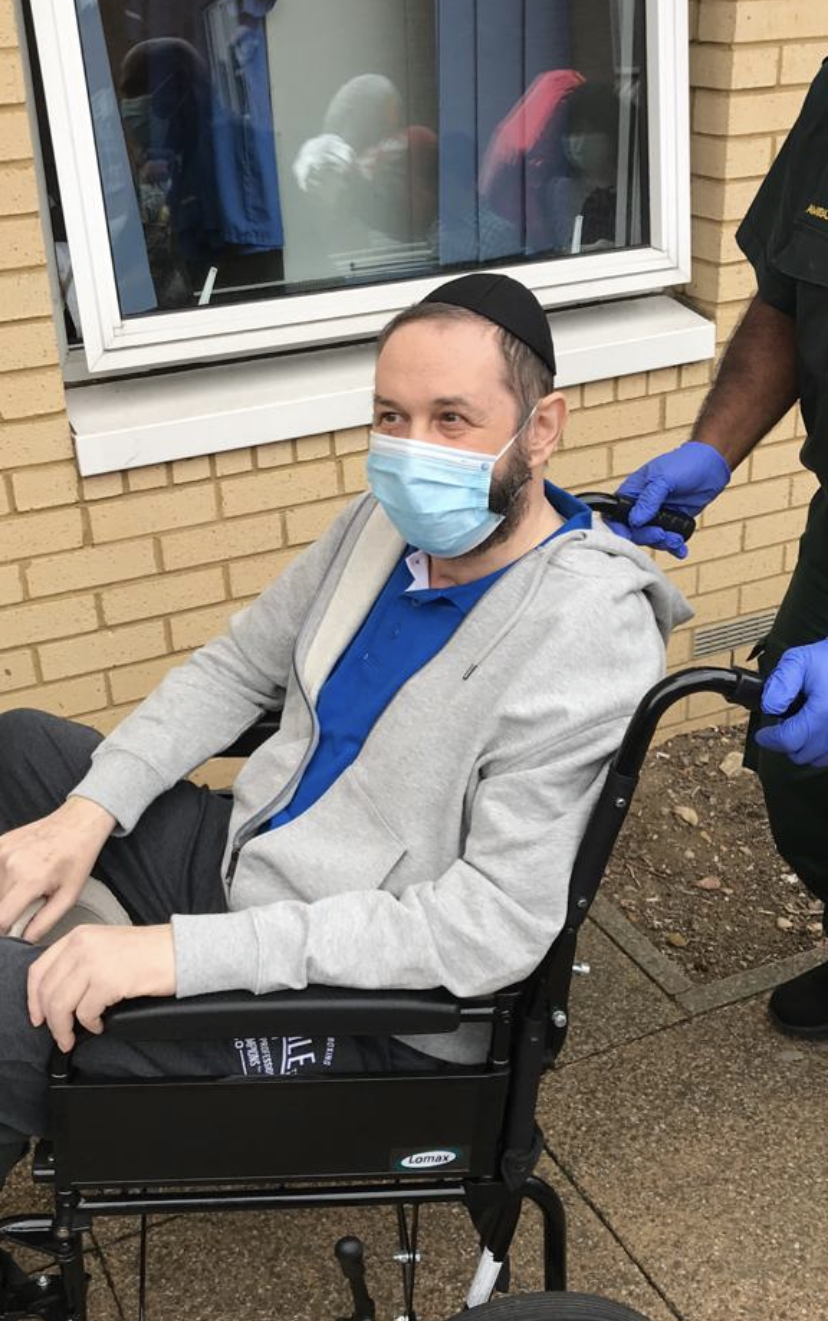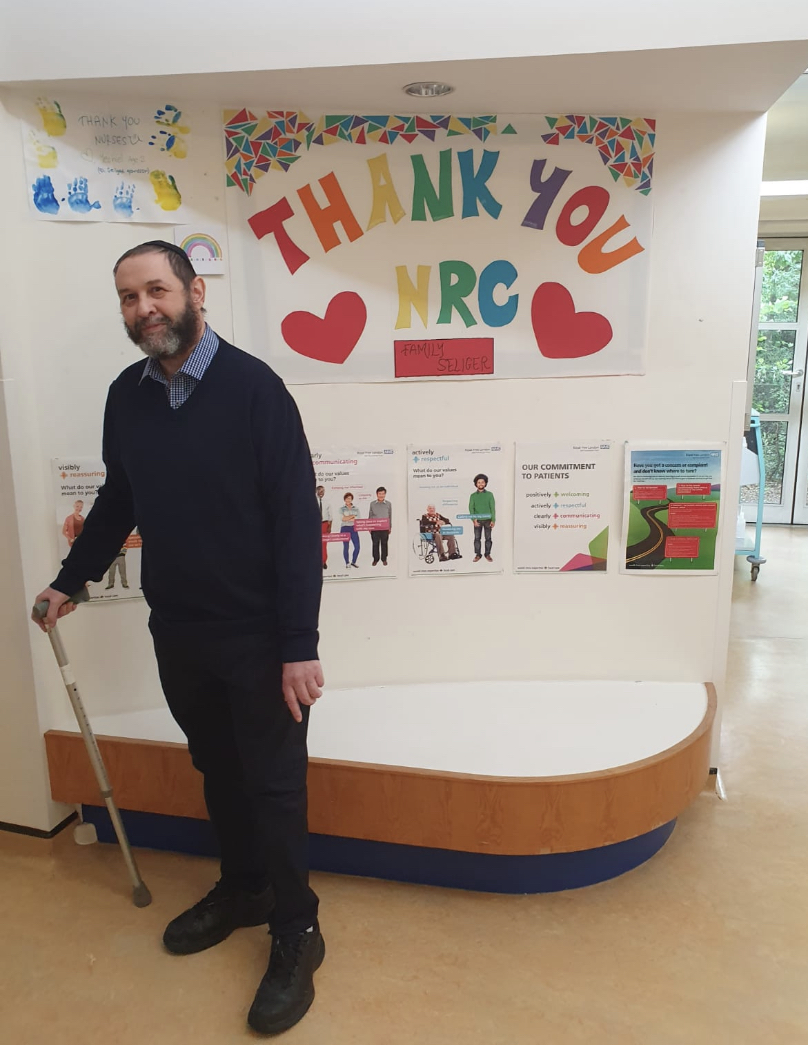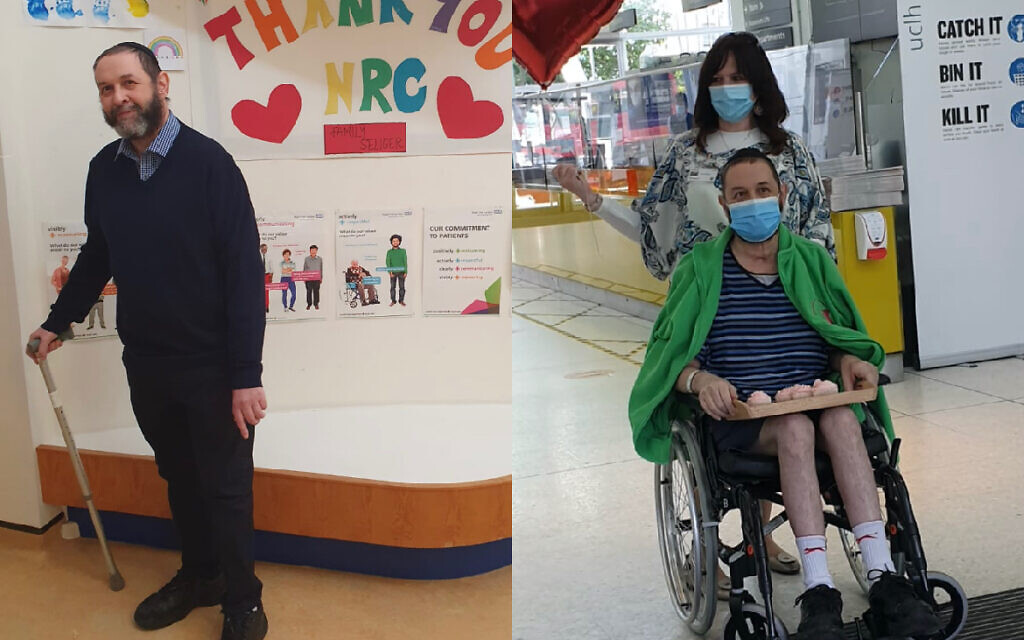Charity chief’s year-long Covid ordeal: ‘They called my wife in to say goodbye’
Eli Seliger was a 'non-Covid believer' before falling ill and being admitted to hospital a year ago this week - but now pleads with the community to follow rules
An Orthodox businessman who spent more than two months in intensive care battling coronavirus has spoken for the first time of his ordeal – and urged the community to respect government restrictions.
Eli Seliger, 54, from Golders Green, opened up to Jewish News about his kids’ heartache and the moment doctors called his wife to hospital to say “goodbye”.
But after being treated for the coronavirus for 22 weeks – including nine weeks in intensive care and more than three weeks in rehabilitation – the father of seven and grandfather of three was celebrating this week after being taking his first dose of the Astra-Zeneca vaccination on Sunday.
Get The Jewish News Daily Edition by email and never miss our top stories Free Sign Up
Mr Seliger, the UK chairman of Israeli cancer charity Zichron Menachem, told the Jewish News that ahead of contracting the virus, he was “very much a ‘non-COVID believer’. I thought it was something that would pass in time. I did not believe in any way, that it would take over or change my life.”
In March 2020, he started to feel “very sick. I felt shivery and feverish”. He left an outdoor minyan and stayed at home, to avoid making anyone else ill. Flippantly, he told his son to “daven” for him.

But his son shared the call to prayer under his father’s Hebrew name. The call reached a volunteer at the Hatzola community ambulance service, who ended up visiting Mr Seliger’s brother, Danny Seliger – who was also unwell. That evening on the 26 March, both Eli and Danny Seliger, 69, were taken to hospital by Hatzola, with COVID-19 symptoms. At one stage, the brothers were unknowingly being treated besides one another – only separated by a curtain.
A day after he was taken to hospital, Mr Seliger was put in an induced coma. He describes this period as “sleeping”.
Over the next three months, he was transferred from the Royal Free Hospital to the University Hospital London, suffering various complications including: seizures, respiratory failure, pneumonia, blood clots and sepsis. He was diagnosed with an inflammation of the brain called ADEM, a rare condition in adults. “They are now writing papers about what happened to me. It was all triggered by COVID,” he said.
My message is for people to adhere to the government guidelines; people going to shul or a shop should respect the rules and wear a mask. Refusing vaccinations is unacceptable.
Throughout the period, rabbis gave his wife dispensation to use technology to contact her husband every day including on Shabbat. Every day the family would call and sing to Mr Seliger over video calls, as he lay in a coma. “The family liaison officer told me she still remembers the cries of my children waiting for me to respond, telling me they needed me home. She says she will never forget it.”

On 29 April, with his condition continuing to deterioriate, his wife Lea was called to UCH. “The doctors called my wife to say ‘goodbye’. She said she would only come to say ‘hello’. She told people she was coming to see me and all over the world, they were saying ‘tehillim’. Her survival quote was: ‘When there is life, there is hope. But she was told that if I woke up, I might be a vegetable, I might be paralysed, or I might not wake up at all. They had no hope for me whatsoever.”
A month later, he opened his eyes. “I remember wondering where I was,” he recalled. “I knew how serious it was when I realised I could not walk any more, I could not lift my left foot. It was very scary, frightening. No one was there to explain it to me, only the doctors.
“I could not even remember my wife’s name. I also remember thinking the sound of the machine, was a ping on Uber. I was desperate for a drink – and I said the prayer over water.”
she was told that if I woke up, I might be a vegetable, I might be paralysed, or I might not wake up at all. They had no hope for me whatsoever.
He described his recovery as a “miracle”. Seliger believes the power of prayer helped him. Over the course of his treatment, the community committed various acts in his name. Around £50,000 was raised for a Sefer Torah to be written in aid of his recovery; tehillim groups with up to 300 participants were hosted online; and rabbis gave Mr Seliger the added Hebrew name, “Raphael” (“healing”). Meanwhile, his brother Danny was given an additional Hebrew name, “Chaim” (“life”). “Prayers saved my life,” he said.
Whilst Seliger had no pre-existing conditions ahead of contracting the virus but life is now very different for him. Over the period, he lost more than 30 kilos. Now, he takes 21 pills a day and has undergone an extensive course of rehabilitation to walk again. He still struggles to concentrate for long periods but is focusing on the positives. He took his first steps in July 2020, slowly moving from a wheelchair to a frame and then a walking stick. Eventually, he stopped using that too, walking outside his home for the first time in December. “I am a fighter; I am not allowing it to disturb me. I am focusing on the positivity of wanting to walk, to do my exercises,” he said.
Seliger is also using his personal experience to call on the community to prevent the spread of the virus. He said: “My message is for people to adhere to the government guidelines; people going to shul or a shop should respect the rules and wear a mask. Refusing vaccinations is unacceptable.”
Born in Johannesburg, Seliger works in property development but is now focusing on his family. Ahead of his ordeal he would wake up at 5am to learn, ending the day at 11pm. “My life is a blessing. I was not spending as much time with my family, now I have decided it is time to change.”

Thank you for helping to make Jewish News the leading source of news and opinion for the UK Jewish community. Today we're asking for your invaluable help to continue putting our community first in everything we do.
For as little as £5 a month you can help sustain the vital work we do in celebrating and standing up for Jewish life in Britain.
Jewish News holds our community together and keeps us connected. Like a synagogue, it’s where people turn to feel part of something bigger. It also proudly shows the rest of Britain the vibrancy and rich culture of modern Jewish life.
You can make a quick and easy one-off or monthly contribution of £5, £10, £20 or any other sum you’re comfortable with.
100% of your donation will help us continue celebrating our community, in all its dynamic diversity...
Engaging
Being a community platform means so much more than producing a newspaper and website. One of our proudest roles is media partnering with our invaluable charities to amplify the outstanding work they do to help us all.
Celebrating
There’s no shortage of oys in the world but Jewish News takes every opportunity to celebrate the joys too, through projects like Night of Heroes, 40 Under 40 and other compelling countdowns that make the community kvell with pride.
Pioneering
In the first collaboration between media outlets from different faiths, Jewish News worked with British Muslim TV and Church Times to produce a list of young activists leading the way on interfaith understanding.
Campaigning
Royal Mail issued a stamp honouring Holocaust hero Sir Nicholas Winton after a Jewish News campaign attracted more than 100,000 backers. Jewish Newsalso produces special editions of the paper highlighting pressing issues including mental health and Holocaust remembrance.
Easy access
In an age when news is readily accessible, Jewish News provides high-quality content free online and offline, removing any financial barriers to connecting people.
Voice of our community to wider society
The Jewish News team regularly appears on TV, radio and on the pages of the national press to comment on stories about the Jewish community. Easy access to the paper on the streets of London also means Jewish News provides an invaluable window into the community for the country at large.
We hope you agree all this is worth preserving.
-
By Laurent Vaughan - Senior Associate (Bishop & Sewell Solicitors)
-
By Laurent Vaughan - Senior Associate (Bishop & Sewell Solicitors)
-
By Laurent Vaughan - Senior Associate (Bishop & Sewell Solicitors)
-
By Laurent Vaughan - Senior Associate (Bishop & Sewell Solicitors)






















